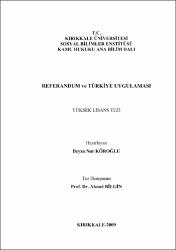| dc.contributor.advisor | Bilgin, Ahmet | |
| dc.contributor.author | Köroğlu, Beyza Nur | |
| dc.date.accessioned | 2021-01-16T18:58:46Z | |
| dc.date.available | 2021-01-16T18:58:46Z | |
| dc.date.issued | 2009 | |
| dc.identifier.uri | | |
| dc.identifier.uri | https://hdl.handle.net/20.500.12587/15205 | |
| dc.description | YÖK Tez ID: 261353 | en_US |
| dc.description.abstract | Bu çalışmanın konusunu genel olarak referandum ve Türkiye'deki uygulamaları oluşturmaktadır. Bu çalışmada, demokrasi kavramı ve demokrasi biçimlerinden başlayarak; konusu, hukuki bağlayıcılığı, yapılış usulü, kaynağı ve halkın gerçek iradesini yansıtması açısından referandumun türleri teferruatlı bir şekilde anlatılmıştır. Devamında referandumun hukuki niteliği, demokrasi yönünden olumlu ve olumsuz yönleri ve plebisitle farkları incelenmiştir. Türkiye'de uygulanan referandumların bu açılardan değerlendirme ve eleştirilerine yer verilmiştir.Türk Anayasa Tarihinde bugüne kadar beş referandum gerçekleştirilmiştir. Bunlardan 1961 ve 1982 Anayasası referandumları bir anayasanın kabulü için yapılmıştır. Her ikisi de anayasal olarak düzenlenmemiş olup, zorunlu nitelik taşımaktadır. Ayrıca kontrollü ve hegemonyacı bir yapı da arz etmektedirler ki; özellikle 1982 Anayasası referandumu, plebisiter niteliğiyle de dikkat çekmektedir.1987, 1988 ve 2007 yıllarında yapılan referandumlar ise anayasa değişikliklerinin kabulü için gerçekleştirilmişlerdir. Her üç referandum da anayasal olarak düzenlenme, halkın pasif rol alması, onay niteliğinde ve zorunlu olma özelliklerine sahiptir. Bunlardan 1988 referandumu, sandıktan çıkan ?hayır? sonucuyla; referandum kurumunu, hükümetin güvenoyu tazeleme aracı olmaktan çıkarmıştır. | en_US |
| dc.description.abstract | This thesis generally focuses on referendum and its practices in Turkey. In this study, starting from the democracy concept and its styles; subject-matter of referendum, its law enforcement, procedure, resource and types in terms of reflecting the real public?s will are explained in detail. Later on, the legal qualification of referendum, its positive and negative sides in terms of democracy and the plebiscite differences are examined. The evaluations of and critics on the referendums in these respects applied in Turkey are given place.There have been five referendums in Turkish Constitution history up to today. Among these, 1961 and 1982 Constitution referendums were held for acceptance of a constitution. Both of them were not arranged constitutionally but they were compulsory. Additionally, they have a controlled and hegemonic structure and especially the 1982 Constitution referendum attracts attention with its plebiscite feature.Those referendums in 1987, 1988 and 2007 were held for acceptance of the constitutional amendments. All of those three referendums carry out characteristic like being constitutionally arranged, passive role of public and being compulsory and for acceptance. Among these, the 1988 referendum saved the referendum institution from being government?s device of restoring vote of confidence as a result of `no? in elections. | en_US |
| dc.language.iso | tur | en_US |
| dc.publisher | Kırıkkale Üniversitesi | en_US |
| dc.rights | info:eu-repo/semantics/openAccess | en_US |
| dc.subject | Hukuk | en_US |
| dc.subject | Law | en_US |
| dc.title | Refereandum ve Türkiye uygulaması | en_US |
| dc.title.alternative | Referendum and its practices in Turkey | en_US |
| dc.type | masterThesis | en_US |
| dc.contributor.department | KKÜ, Sosyal Bilimler Enstitüsü, Kamu Hukuku Anabilim Dalı | en_US |
| dc.identifier.startpage | 1 | en_US |
| dc.identifier.endpage | 143 | en_US |
| dc.relation.publicationcategory | Tez | en_US |
















